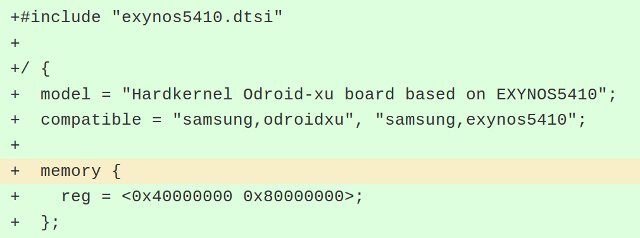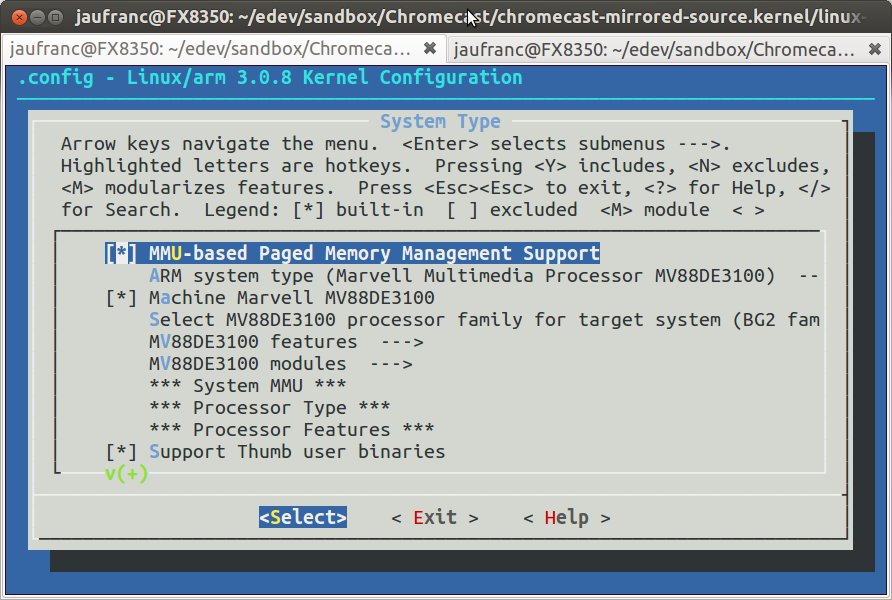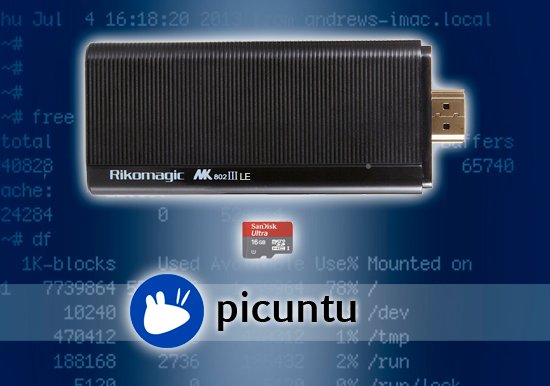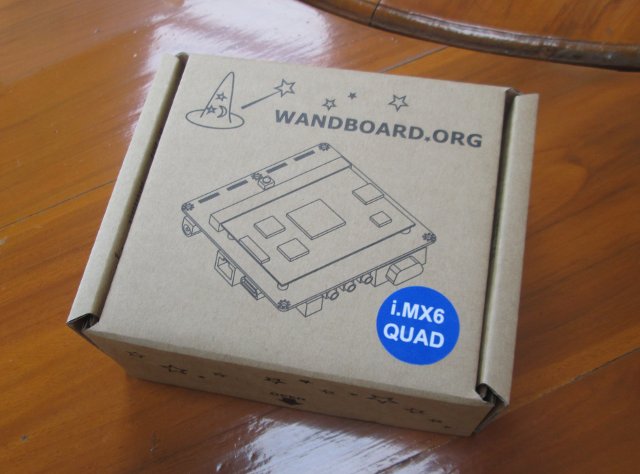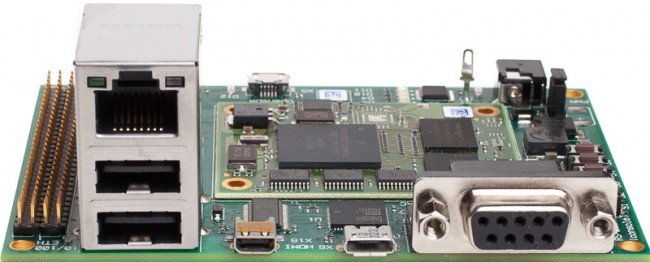Hardkernel have already done a good job at bringing low cost, high performance development boards based on Exynos 4 Quad processor with boards such as ODROID-X, ODROID-U2, or ODROID-X2. But it appears they are not stopping here, and have recently committed code to support ODROID-XU development board based on Exynos 5410, the 8-core big.LITTLE SoC from Samsung, used in devices such as Galaxy S4. The committed code linked above point the device tree files in arch/arm/boot/dts/ (exynos5410-odroidxu.dts and exynos5410-pinctrl.dtsi) where we can see the board will have 2 GB RAM, and the Cortex A15 cores with be clocked at 1.6 GHz. Exynos5410-odroidxu.dts has been removed from 3.11 branch, so the link above points to an earlier commit. Exynos 5410 might have been the first big.LITTLE processor ever available, but it comes with a major flaw, as it only supports cluster migration (all 4 Cortex A15 or all 4 Cortex A7 […]
Chromecast Open Source Code: Linux Kernel, Toolchain, Bootloader, and More
Google has made quite a stir by introducing Chromecast, and entering the HDMI TV Stick market. We already know the device is based on Marvell 88DE3005 SoC with 512 MB, and since the product are already been shipped to customers in the US, it was just a question of time before the release of the open source code, and everything you need appears to be available at https://code.google.com/p/chromecast-mirrored-source/ Let’s have a look at what we have in the different repositories: Wiki – Empty… Kernel – Linux 3.0.8 source code Prebuilt – Binary toolchain: arm-unknown-linux-gnueabi-4.5.3-glibc Toolchain – Source code for the toolchain above. External – Source code for alsa-libs, dnsmask, libexit and nss sdk – bootloader and DirecFB 1.6.1 vendor – Looks like qt source used in some netflix app (not sure) Chromium – README explaining how you can download Chromecast Chromium source code: 1.8GB tarball + you need to contact […]
149 Euros Geeksphone Peak+ Phone Running Firefox OS (B2G) is Available for Pre-order
The first Firefox OS phone, ZTE Open, has been selling in Spain since the beginning of the month, and Alcatel One Touch Fire has been available a few days later in Germany. Both of those phones have low hardware specs with a single core processor, and 256 MB RAM. There’s now a more powerful alternative, Geeksphone Peak+, based on Geeksphone Peak Developer Preview phone, featuring Qualcomm Snapdragon S4 MSM8255 dual-core processor with 1GB RAM. Here are the specs of the phone: SoC – Qualcomm Snapdragon S4 (MSM8225) dual-core processor @ 1.2 GHz with Adreno GPU System Memory – 1 GB RAM Storage – 4 GB Flash + micro SD card slot Display – 4.3 inch, 960 x 540 pixel IPS display Camera – 8MP rear camera and 2MP front camera Connectivity – WiFi, Bluetooth, FM radio, GPS Networks – GSM 850/900/1800/1900 (2G EDGE), UMTS 850/1900/2100 (3G HSPA). Sensors – Light […]
Rikomagic Announces MK802III LE and MK802IV LE mini PCs Preloaded with Linux (Picuntu)
If you’ve been following the ARM based mini PC space, you may already know about Rikomagic MK802 III and MK802 IV HDMI TV Sticks, respectively based on Rockchip RK3066 and RK3188, running Android Jelly Bean. Rikomagic and Cloudsto Electronics have just announced they will launch a “Linux Edition” (LE) for those two devices called MK802III LE and MK802IV LE Quad Core, running Picuntu (Ubuntu) Linux. Since Linux on RK3188 is still work on progress, Cloudsto MK802III LE will be available first, with the following specs: SoC – Rockchip RK3066 dual core Cortex A9 @ 1.6Ghz + Mali-400 MP4 GPU System Memory – 1GB RAM Storage – 16GB Micro SD card preloaded with PicUntu, but no word about NAND flash Video Output – HDMI (1080p) Connectivity – Wifi 802.11 b/g/n USB – 2 x USB ports It’s not very clear if the hardware will be slightly tweaked (e.g. smaller NAND flash, […]
Wandboard Quad Unboxing, Getting Started with Android and Linux (via The Yocto Project)
After my review of the Wandboard Dual in February, I’ve now received Wanboard Quad development board powered by Freescale i.MX6 Quad Cortex A9 processor, with 2 GB RAM, HDMI output, Gigabit Ethernet, and SATA. The board is available from several distributors including Mouser ($139), DigiKey ($144.38) and FutureElectronics ($125). I’ll start by showing some unboxing pictures of the board, as well as pictures of Wandboard Dual and Quad side-by-side. Then I’ll explain how to install Android and Linux on the board, build the images from source, run some benchmarks, and test different features. Wandboard Quad Unboxing Ive received the board via UPS in a large box that contained the package below. This is exactly the same as Wandboard Dual, except for the sticker. There’s just the board inside the package, and it would just look like Wandboard Dual with all connectors on the top, and the EDM module at the back, […]
$55 Phytec Cosmic Boards Feature Freescale Vybrid SoCs
Freescale Vybrid SoC family has been announced at the beginning of last year, with the low-end VF3xx and mid-end VF4xx featuring a single Cortex A5 CPU, and the higher-end VF6xx and VF7xx providing a multi-core processor with Cortex A5 and Cortex M4 cores, for respectively performance, and real-time/low power tasks. Phytec has just announced the Cosmic board featuring Freescale Vybrid VF6xx single core Cortex A5 processor, and Cosmic+ board with Vybrid VF6xx Cortex A5 + Cortex M4 processor. Both boards are comprised of a baseboard coupled with a Phytec phyCORE-Vybrid system-on-module (SoM), and can be used for Linux and MQX (Freescale RTOS) development. Cosmic / Cosmic+ boards specifications: Processor VF5xx ARM Cortex-A5 @ 500MHz (Cosmic) VF6xx ARM Cortex-A5 @ 500MHz + ARM Cortex-M4 @ 167 MHz (Cosmic+) System Memory – 512 MB DDR3 Storage – 512 MB NAND + micro SD slot USB – HS USB OTG / HS USB […]
$359 Red Pitaya Board Combines an Oscilloscope, a Spectrum Analyser, a Waveform Generator and More
If you need to setup an electronics lab, the cost of equipment such as an oscilloscope, spectrum analyzer, can quickly add up and become expensive. There are already some attempts at low cost measurement devices such as the $35 ExpEyes Junior or pocket size digital storage oscilloscopes (~$200), but those are far from the performance achieved with regular measurement devices. Red Pitaya measurement board brings the performance level and flexibility a bit higher, and stays relatively low cost at $359, with a Linux-based solution based on Xilinx Zynq dual Cortex A9 + FPGA SoC. Hardware Specifications: SoC – Xilinx Zynq Z7010 dual core Cortex A9 CPU + FPGA System Memory – 1GB DDR2 RAM Storage – microSD card slot (For system and FPGA images, and data) Connectivity – 10/100M Ethernet USB – 2x micro USB ports (1 for power, 1 for console), and 1x USB 2.0 Host port Signals: 2x […]
Fedora 19 ARM Remix R1 Release With Support for AllWinner A10, A10s, A13 and A20 SoCs
After releasing a stable version of Fedora 18 for AllWinner A10 and A13 in February, Hans de Goede, working at Red Hat and a Fedora contributor, has recently announced “Fedora 19 ARM remix for Allwinner SOCs” on linux-sunxi community mailing list. This released based on Fedora 19 for ARM together with linux-sunxi kernel and u-boot, adds support for A10s and A20 based devices, and 38 boards and devices are now supported. To give it a try, download the 665MB image:
|
1 |
wget http://scotland.proximity.on.ca/contrib-images/hansg/Fedora-19-a10-armhfp-r1.img.xz |
then write it to an SD card (8GB or greater):
|
1 2 |
xzcat Fedora-19-a10-armhfp-r1.img.xz > /dev/[device] sync |
Where you have to replace [device] with your actual SD card device, e.g. sdc.Since u-boot is board/product specific, you’ll also have to update u-boot for your hardware. Remove the SD card, re-insert it, and run:<
|
1 |
sh <uboot-part-mount>/select-board.sh |
to display a graphical menu (if dialog is installed on your Linux PC), or a list supported boards and products:
|
1 2 3 4 5 6 7 8 9 10 11 12 13 14 15 16 17 18 19 20 21 22 23 24 25 26 27 28 29 30 31 32 33 34 35 36 37 38 39 |
Available boards: a10_mid_1gb A10 tablet sold under various names (whitelabel) a13_mid A13 tablet sold under various names (whitelabel) a10s-olinuxino-m A10s-OLinuXino-MICRO (Olimex) a13-olinuxino A13-OLinuXino (Olimex) a13-olinuxinom A13-OLinuXino-MICRO (Olimex) a20-olinuxino_micro A20-OLinuXino-MICRO (Olimex) auxtek-t003 Auxtek T003 hdmi tv stick auxtek-t004 Auxtek T004 hdmi tv stick ba10_tv_box BA10 TV Box coby_mid7042 Coby MID7042 tablet coby_mid8042 Coby MID8042 tablet coby_mid9742 Coby MID9742 tablet cubieboard_512 Cubieboard development board 512 MB RAM cubieboard Cubieboard development board 1024 MB RAM cubieboard2 Cubieboard 2 (A20) development board dns_m82 DNS AirTab M82 tablet EOMA68-A10 EOMA68 A10 CPU card gooseberry_a721 Gooseberry development board h6 H6 netbook hackberry Hackberry development board hyundai_a7hd Hyundai a7hd tablet inet97f-ii iNet-97F Rev.2 (and clones) tablet mele_a1000 Mele a1000/a2000 512 MB RAM mele_a1000g Mele a1000g/a2000g 1024 MB RAM mele_a3700 Mele a3700 (a1000g without sata) mini-x Mini-X 512 MB RAM mini-x-1gb Mini-X 1024 MB RAM mk802 mk802 (with female mini hdmi) 512 MB RAM mk802-1gb mk802 (with female mini hdmi) 1024 MB RAM mk802_a10s mk802 with A10s (s with a circle around it on the barcode label mk802ii mk802ii (with male normal hdmi) 1024 MB RAM pcduino pcDuino development board pov_protab2_ips9 Point of View ProTab 2 IPS 9" tablet pov_protab2_ips_3g Point of View ProTab 2 IPS tablet with 3g r7-tv-dongle r7 hdmi tv stick uhost_u1a UHost U1A hdmi tv stick wobo-i5 Wobo i5 TV Box xzpad700 XZPAD700 7" tablet |
Select […]


